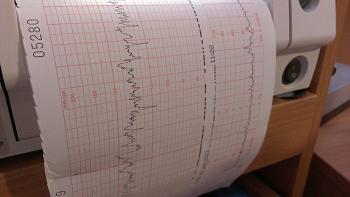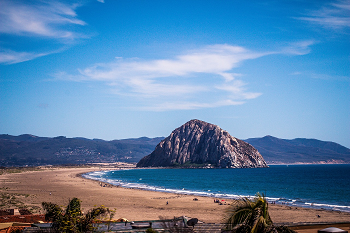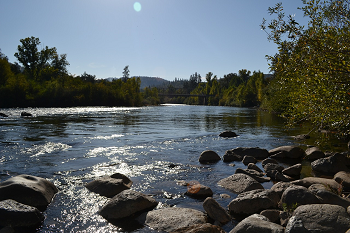
Water Board’s Flow Proposal Falls Short
Annual Legislative Report Card is Posted
For Your Bucket List: Attend Our Annual Convention
Water Board's Flow Proposal Falls Short
By Kyle Jones
The State Water Resources Control Board (Board) has recently updated a plan to determine how much water should remain in California rivers that flow to the San Francisco Bay Delta.
Every aspect of California water is contentious, even the notion that we should leave water in streams. This proposal is no exception.
The modest flow proposal by the Board is garnishing extreme opposition from those who don’t want to do their part to keep endangered species, such as salmon, alive. They insist that it’s their right to use California’s precious resources to make a profit without regard to the environmental consequences.
The instream flow proceedings are part of the Board’s update to the Bay Delta Water Quality Control Plan. That plan dictates how the State will ensure that the Delta can become a healthy waterway for the environment and people who depend upon it.
The Board has broken up this herculean plan update into three phases. Phase 1 will determine flows for the San Joaquin River and its tributaries. Phase 2 will do the same for the Sacramento River. Phase 3 will adjust water rights accordingly so that we can be sure the water will be there.
The latest draft proposal by the Board for Phase 1 calls for 30-50% of the water on the Stanislaus, Tuolumne, and Merced Rivers, which are tributaries to the San Joaquin, to remain in the rivers to support fish, wildlife, and water quality.
While a good first step, this proposed water flow is short of what fish and the environment need to succeed. Stakeholders and other state agencies, including the Department of Fish and Wildlife, have determined that 50-60% of unimpaired flows are needed to provide for salmon recovery on these streams. Sierra Club California and our allies argue that the Board should follow the science and move to the higher flow standard.
You can help make sure the streams stay alive. Send a message to the Board members thanking them for setting instream flows, but reminding them that the science demands that the flows be set higher to save the salmon. Comments can be submitted to the Board at commentletters@waterboards.ca.gov. Be sure to use the subject line “Comment Letter – 2016 Bay-Delta Plan Amendment & SED.”
There are also going to be three public meetings on the Bay-Delta Plan. The Board will be meeting in Sacramento on November 2 and 10, and in Modesto on November 4. There will be opportunities for public comment. More details on meetings and the plan can be found at: http://www.waterboards.ca.gov/waterrights/water_issues/programs/bay_delta/bay_delta_plan/water_quality_control_planning/2016_sed/docs/20160915_ph1_notice.pdf.
The Board has heard from the other side, now let them hear that Californians don’t want the board to squander the salmon and our environment for private benefit. Tell the Board members they need to listen to science and move for higher flows for the Delta.
 Annual Legislative Scorecard is Posted
Annual Legislative Scorecard is Posted
By Kathryn Phillips
Every year in late summer, after the legislature finishes its business and assembly members and senators head home to their districts, Sierra Club California staff get busy on our annual report card.
That simple publication provides a tool for our members and supporters to see how well—or not-so-well—their legislators did on environmental policy.
The 2016 report card has just been completed. You can find it on our website at: http://www.sierraclub.org/california/report-cards
Of the 13 bills we scored, 11 made it to a floor vote in the second house. Of those, seven passed. All of the ones that passed were signed by the governor.
The scorecard bills reflect just a fraction of the bills that Sierra Club California staff, guided by its volunteer leaders, take positions on and lobby each year. In 2016, more than 400 bills were introduced that had environmental content. Of those, we took positions on about 160. Of those, 54 made it to the governor’s desk—and we opposed a handful of those that made it that far.
We don’t reveal which bills we will score until the legislative session is over. Frankly, we never know which ones are sure to appear on the scorecard until the session is over and we’ve had a chance to evaluate the full range of bills we have followed and what the status of those bills reveal about the legislature’s performance.
In 2016, only seven assembly members and 11 senators received scores of 100 percent. A lot of good scores were dragged down by the failure of the Assembly to pass SB 1190, the reform bill that would have prohibited California Coastal Commission members from having private conversations about matters pending before the commission.
If your legislator scored an 80 or more, you have a legislator who has a strong record on environmental issues and can usually be counted on to thoughtfully weigh the environmental benefits and what’s best for Californians.
If your legislator scored in the 70s, that legislator probably isn’t someone you can routinely count on to vote for your best interests when the oil industry or some other big polluting interest is involved in an issue.
If your legislator received less than 70 percent, there is trouble in paradise. You should consider visiting or calling your legislator and encouraging solid work on improving that score next year.
 For Your Bucket List: Attend Our Annual Convention
For Your Bucket List: Attend Our Annual Convention
If you think you might be looking for a way to be among friends with common values after the November election, you need look no further than Sierra Club California’s annual convention.
Held at Rancho El Chorro, a quaint school camp in the hills west of San Luis Obispo, this year’s annual meeting will provide a chance to celebrate some monumental achievements—both political and environmental.
The event runs from Friday evening, November 11, until mid-day Sunday, November 13. You can sign up to stay at the low-cost bunkhouses at the camp, or you can arrange your own lodging at a broad range of motel options in nearby Morro Bay.
There will be a pizza party on Friday evening, a celebration of national monuments on Saturday evening, and Aaron Mair, the dynamic president of Sierra Club’s national board of directors, will be our keynote speaker mid-day on Saturday.
Throughout the weekend, there will be opportunities to learn more about Sierra Club projects and activism and all the ways you can be involved.
Register to attend at http://www.sierraclub.org/california/annual-convention#registration.
Follow Us:
  |
Thank you for being a part of our work! You may securely donate online or by sending a check to Sierra Club California at 909 12th Street, Suite 202, Sacramento, CA 95814.

